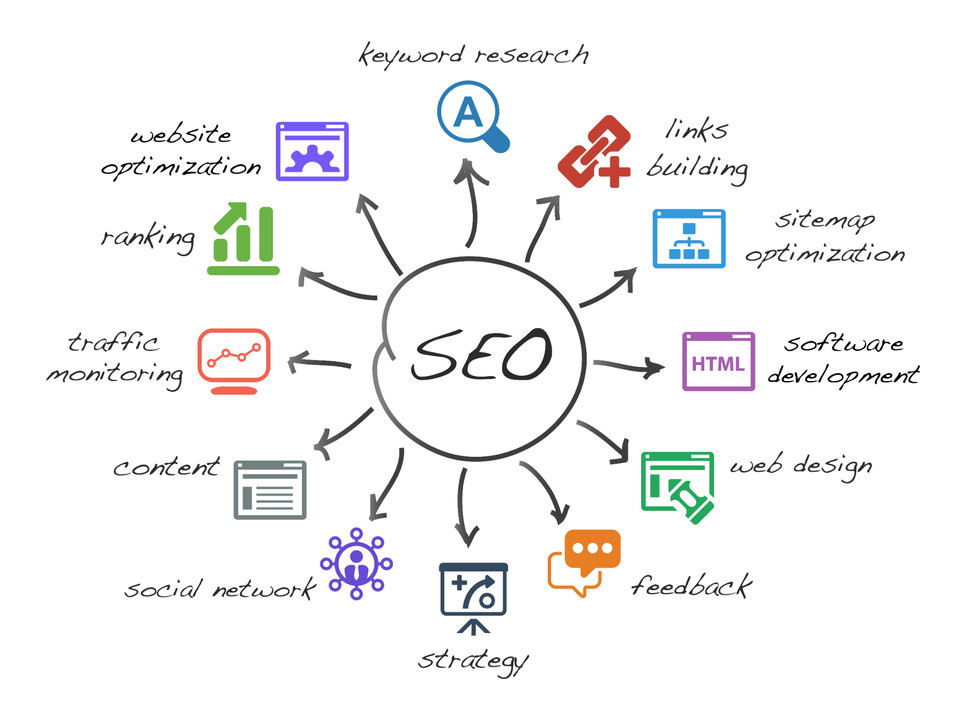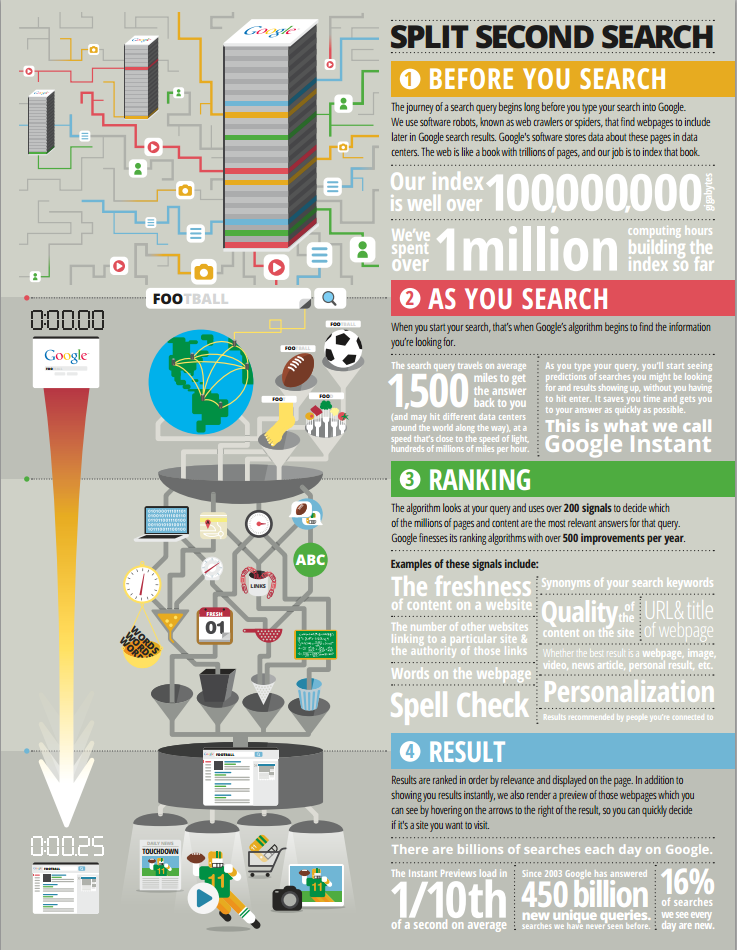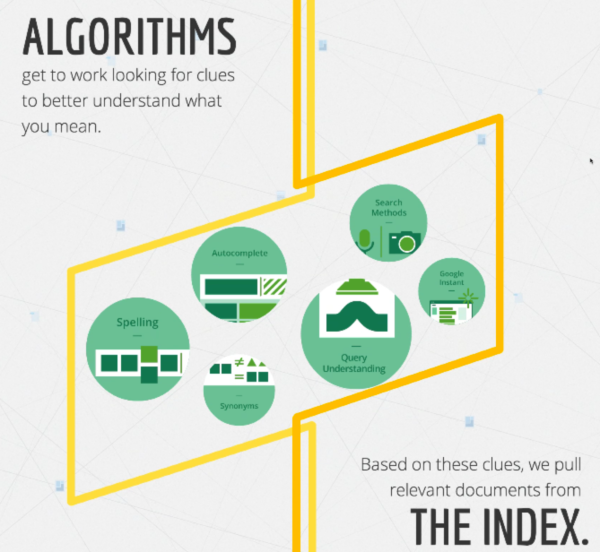Uncover the secrets behind Google’s search algorithm and learn how it impacts your online presence in ways you never knew.

Image courtesy of via DALL-E 3
Table of Contents
- Introduction to Google Search Algorithm
- How Does Google Search Work?
- Important Parts of the Algorithm
- Updates to the Algorithm
- How to Make a Website Rank Well
- Tools to Help with SEO
- Common Mistakes to Avoid
- The Future of Google Search
- Summary of Google Search Algorithm
- Frequently Asked Questions (FAQs)
Introduction to Google Search Algorithm
When you type something into Google to search for information on the internet, magic happens behind the scenes to show you the most relevant websites. This magic is called a Google search algorithm. Let’s break down what this means and why it’s important, all in simple language that even a fifth-grader can understand.
What is a Google Search Algorithm?
Think of a search algorithm like a super-smart robot librarian that helps you find exactly what you’re looking for online. This robot librarian quickly scans through all the billions of websites on the internet and picks out the ones that match your search words. So, when you type, “funny cat videos,” into Google, the algorithm works to find websites that have those exact words.
Why Should We Care?
Understanding how the Google search algorithm works can make sure that when you look for something like “how to bake cookies,” you get yummy cookie recipes and not instructions for building a spaceship! Knowing how this robot librarian helps us find information online can make our internet searches quick and easy.
How Does Google Search Work?
Google uses a special software program called a “crawler” to navigate the vast expanse of the internet. This crawler goes from website to website, following links and collecting information about each page it visits. It saves this information in a gigantic database known as an index. So, when you type a question into the Google search bar, it looks through this index to find the most relevant websites that match your query.
Ranking Pages
Once Google has found a bunch of websites that might answer your question, it needs to decide which ones are the most helpful. To do this, Google uses a complex algorithm that takes into account many factors, such as the quality of the content, how many other websites link to it, and how users interact with the page. Based on these factors, Google ranks the websites in order of relevance, showing you the best possible answers at the top of the search results.
Important Parts of the Algorithm
In the world of Google search algorithms, keywords play a crucial role. Think of keywords as the secret code that helps Google understand what you’re looking for. When you type a query into the search bar, Google scans through websites to find those magic keywords that match your search. So, choosing the right keywords is like giving Google a map to guide it to the most relevant websites for your query.

Image courtesy of www.linkedin.com via Google Images
Relevance
Relevance is another key ingredient in the Google search algorithm recipe. Once Google finds websites with your keywords, it checks to see if they are a good match for what you’re looking for. The more relevant a webpage is to your search query, the more likely it is to show up at the top of your search results. So, when you see a webpage ranking high, it’s because it’s been deemed highly relevant to what you’re searching for.
Links
Links are like the virtual highways that connect different websites in the vast online world. When Google sees a webpage with lots of other websites linking to it, it considers that webpage trustworthy and valuable. Think of it as a vote of confidence from other websites. So, the more quality links a webpage has pointing to it, the higher it may rank in Google search results.
User Experience
User experience is all about how people interact with a webpage. Google pays close attention to factors like how fast a webpage loads, how easy it is to navigate, and how engaging the content is. Websites that provide a great user experience are more likely to rank higher because Google wants to show users the best possible results. So, remember, the smoother and more enjoyable your experience on a webpage, the better its chances of ranking well in Google search.
Updates to the Algorithm
Google is constantly working to make sure its search engine provides the best results for users like you. One way they do this is by updating their search algorithm. Think of an algorithm like a recipe that tells Google how to find and rank websites when you search for something. These updates help Google show you the most helpful websites at the top of your search results.
Why Google Updates the Algorithm
Google updates its algorithm to make sure it keeps getting better at finding what you’re looking for. The internet is always changing, with new websites, content, and ways people search. By updating the algorithm, Google can stay up-to-date with all these changes and make sure you get the most relevant results when you search for something.
Famous Algorithm Updates
Over the years, Google has released some famous updates to its algorithm that had a big impact on search results. For example, there was an update called Panda that focused on rewarding websites with quality content while penalizing those with low-quality or duplicate content. Another major update was called Penguin, which cracked down on websites that tried to cheat the system by using shady tactics to boost their rankings.
How to Make a Website Rank Well
When you want your website to show up at the top of Google’s search results, it’s important to use the right keywords. Keywords are the words or phrases people type into Google when they are searching for something. By using these keywords in your website’s content, you can help Google understand what your site is about and when to show it to people searching for those keywords.

Image courtesy of www.warrenchandler.com via Google Images
Creating Quality Content
Having high-quality and relevant content on your website is crucial for ranking well in Google search results. This means writing articles, making videos, or creating images that are useful, interesting, and informative for your visitors. The more valuable your content is, the more likely it is to be shared and linked to by other websites, which can improve your site’s ranking.
Building Links
Links are like digital votes of confidence for your website. When other websites link back to yours, it tells Google that your site is trustworthy and valuable. To build links, you can reach out to other websites and ask them to link to your content, or you can create content that is so good that other websites naturally want to link to it. Building a strong network of links can help boost your website’s visibility and ranking in search results.
Improving User Experience
Google wants to show the best and most user-friendly websites at the top of its search results. To make sure your website ranks well, you need to focus on making it easy and enjoyable for visitors to use. This means having a clean and organized layout, fast loading times, and clear navigation. By prioritizing the user experience, you can help increase the chances of your site ranking well in Google search results.
Tools to Help with SEO
Google Analytics is a powerful tool that helps you track and analyze the performance of your website. By using Google Analytics, you can gain valuable insights into how visitors interact with your site, which pages are the most popular, and where your traffic is coming from. This information can help you make informed decisions on how to optimize your website for better search engine visibility.
Other Helpful Tools
In addition to Google Analytics, there are other useful tools that can assist you in optimizing your website for search engines. Google Search Console, for example, provides valuable data on how your site is performing in Google’s search results, allowing you to identify and fix any issues that may be impacting your rankings. Third-party SEO software like SEMrush or Moz can also provide in-depth insights into your website’s SEO performance and offer suggestions for improvement.
Common Mistakes to Avoid
One common mistake many people make when trying to improve their website’s search engine optimization (SEO) is keyword stuffing. Keyword stuffing is when you use too many keywords in your content in an attempt to manipulate your site’s ranking in search results. While it’s important to use relevant keywords to help Google understand what your page is about, overloading your content with keywords can actually have the opposite effect. Google’s algorithm is smart enough to recognize when keywords are being used unnaturally, and it can penalize your site for trying to game the system.

Image courtesy of searchengineland.com via Google Images
Ignoring Mobile Users
In today’s digital age, more and more people are using their smartphones and tablets to browse the internet. If your website is not optimized for mobile devices, you could be missing out on a huge chunk of potential visitors. Google takes into account how mobile-friendly a website is when ranking search results, so if your site is not responsive or mobile-friendly, it could be hurting your SEO efforts. Make sure your website looks and works well on all devices to provide the best user experience possible.
Poor Link Practices
Links are an important part of SEO, but using them improperly can actually harm your website’s ranking. It’s crucial to avoid bad linking practices such as buying links, trading links with irrelevant sites, or having too many low-quality links pointing to your site. Google values natural, organic links that come from reputable websites. Focus on building high-quality backlinks from relevant and trustworthy sources to improve your website’s credibility and ranking in search results.
The Future of Google Search
Artificial Intelligence, or AI, is a technology that allows machines to perform tasks that typically require human intelligence, like understanding language or recognizing images. Google is already incorporating AI into its search algorithm to better understand user queries and provide more relevant search results. In the future, AI could help Google anticipate what you’re looking for before you even finish typing your query, making searches faster and more accurate.
Voice Search
Voice search is another exciting development in the future of Google search. With the rise of virtual assistants like Google Assistant and Amazon’s Alexa, more and more people are using their voice to search for information online. In the coming years, voice search could become even more sophisticated, allowing users to have conversations with their devices and receive more personalized search results based on their habits and preferences. This could revolutionize the way we interact with the internet and find information.
Summary of Google Search Algorithm
In this article, we’ve delved into the intricate world of the Google Search Algorithm and how it shapes our online search experience. Let’s recap the key points covered so far.

Image courtesy of gorilla360.com.au via Google Images
What is a Google Search Algorithm?
The Google Search Algorithm is like a smart assistant that helps us find the most relevant websites when we type in a search query. It sifts through the vast expanse of the internet to present us with the most useful information.
Why Should We Care?
Understanding the Google Search Algorithm is crucial because it influences the results we see when we search online. By knowing how it works, we can navigate the internet more efficiently and find what we need quickly.
How Does Google Search Work?
Google uses a process called crawling and indexing to find new websites and store information about them. It then ranks these pages based on their relevance to our search queries, ensuring that the most helpful websites are displayed at the top of the results page.
Important Parts of the Algorithm
Keywords play a vital role in helping Google understand what we’re looking for, while relevance ensures that the search results match our queries. Links indicate the credibility of a website, and user experience influences how websites are ranked.
Updates to the Algorithm
Google continuously updates its algorithm to enhance the search experience. These updates aim to improve the quality of search results and provide users with the most relevant and helpful information.
How to Make a Website Rank Well
To improve a website’s ranking, using good keywords, creating quality content, building links, and enhancing user experience are essential steps. Following these tips can help boost a website’s visibility in search results.
Tools to Help with SEO
Various tools like Google Analytics and Google Search Console can aid in tracking and optimizing website rankings. These tools provide insights into website performance and suggest ways to improve SEO.
Common Mistakes to Avoid
Avoiding mistakes like keyword stuffing, neglecting mobile users, and engaging in poor linking practices can prevent penalties and help maintain a website’s ranking in search results.
The Future of Google Search
The future of Google search may involve advancements in artificial intelligence and voice search technologies, which could revolutionize the way we search for information online.
Want to turn these SEO insights into real results? Seorocket is an all-in-one AI SEO solution that uses the power of AI to analyze your competition and craft high-ranking content.
Seorocket offers a suite of powerful tools, including a Keyword Researcher to find the most profitable keywords, an AI Writer to generate unique and Google-friendly content, and an Automatic Publisher to schedule and publish your content directly to your website. Plus, you’ll get real-time performance tracking so you can see exactly what’s working and make adjustments as needed.
Stop just reading about SEO – take action with Seorocket and skyrocket your search rankings today. Sign up for a free trial and see the difference Seorocket can make for your website!
Frequently Asked Questions (FAQs)
What happens if I use too many keywords?
When you use too many keywords in your website content, it is called keyword stuffing. This can actually harm your website’s ranking on Google. Search engines like Google want content to be helpful and natural for readers. If your content is stuffed with keywords and doesn’t make sense, it can be seen as spammy and may result in your website being penalized, meaning it will show up lower in search results. So, it’s important to use keywords wisely and in a natural way that fits with the content.
How often does Google update its algorithm?
Google updates its algorithm thousands of times each year. These updates can be big or small and are constantly being made to improve the user experience and deliver the most relevant search results. While some updates may go unnoticed, major updates like Panda and Penguin have had significant impacts on search results and how websites are ranked. So, it’s important to stay informed about changes in the algorithm to keep your website optimized for better visibility.
Can I pay Google to rank my website higher?
No, you cannot pay Google to rank your website higher in organic search results. Google’s search algorithm is designed to provide users with the most relevant and useful information based on their search queries, not based on payments. However, Google does offer paid advertising options, like Google Ads, where you can pay to have your website show up at the top of search results as an ad. But organic search results, which are the non-paid results, are determined by a complex algorithm that considers factors like relevance, quality content, and user experience.







